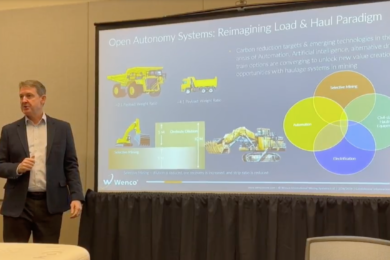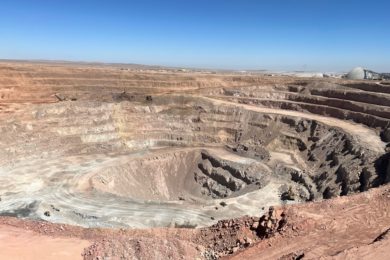The 2009 Paydirt Resources Victoria conference was opened by Victorian Minister, Peter Batchelor, today, with him announcing that the State “is still open for business and offers many investment opportunities.” He continued to say that “despite the changes in the economic landscape, we have still seen many positive stories in Victoria in the last 12 months,” commenting that “coal and gold demand has remained strong.”
The positive stories that Batchelor mentioned include:
- “Work starting on Iluka Resources A$209 million mineral sands Murray Basin Stage 2 project
- “Discoveries of new base metals in western and north-eastern Victoria.
“Our massive coal resource continues to be in high demand, both for traditional uses, such as electricity but also for emerging uses, such as conversion to fertiliser and liquid fuels.
“As we move to tackle climate change we will need to find ways to reduce emissions from coal-fired energy generation which currently supplies more than 90% of Victoria’s energy. The Brumby Government is supporting industry through this important transition with initiatives such as:
- “Our Energy Technology Innovation Strategy – ETIS – which is investing millions in clean coal technologies
- “Clean Coal Victoria (CCV) – was established this year and is a Brumby Government funded organisation dedicated to planning for the long-term extraction, development, use and rehabilitation of the state’s vast and valuable coal resource.
“The combination of strategic planning around our coal resource and significant investment in new technologies and uses for our coal will ensure our coal resource can continue to be a significant contributor to our economy.
“Gold – another of our established resources – has had some mixed results this year.
“On one hand we have had the recent announcement by Lihir [Gold] that it will sell its Ballarat gold project.
“On the flip side we’ve had some very promising results with companies making steady in-roads on certain projects. For example, Bendigo and Northgate have both had some great results this year and you will hear more about those results over the next three days of the conference.
“You will also hear during the conference of the extremely promising work being done by GeoScience Victoria to help assist industry locate what we believe could be over 70 Moz of gold under cover in previously little explored areas.
“The Gold Undercover study – which looked at possible gold deposits under sediment in northern Victoria – is one of our success stories and I’m sure will be a valuable tool for gold explorers in coming years.
“In addition to the gold studies, GeoScience Victoria will also release on day three of the conference studies on:
- Latest research and modelling work being done in the Gippsland Basin around its potential for carbon storage
- Copper prospectivity in western Victoria
- New research into Victoria’s rock origins and how they link to Tasmania
- Leading 3D geological interpretations.
“Our work through GeoScience Victoria, to deliver world class pre-competitive geotechnical research is continuing because we recognise we need to ensure industry has the support and tools to locate new resources and opportunities available in Victoria.
“To support the geotechnical data we are providing for industry we have also been running the Rediscover Victoria Drilling grants program, which supplies grants to support exploration for minerals in greenfield areas.
“We have already had some extremely promising results. For example, Beaconsfield Gold’s copper discovery in western Victoria. The second round of grants, totalling A$700,000 were awarded to 11 companies in November last year.
“The third round of the grants program will be launched shortly, and I’m pleased to announce today, that for the first time we will not only offer grants for mineral exploration but also for geothermal exploration.
“Finally I’d like to touch on progress being made on the regulatory front in Victoria. A review is currently underway on the Mineral Resources (Sustainable Development) Act – MRSDA – which has included industry consultation over the last month.
“This review builds on work done around quarry regulations. A new Code of Practice for Small Quarries was introduced on July 1 and from January 1 next year the Extractives Industries Development Act 1995 – EIDA – will be repealed and extractive industries will be regulated under new provisions in the MRSDA.
“The Victorian Competition and Efficiency Commission has also recently undertaken a review of the State’s existing environmental regulation. Costs, timeframes and uncertainty associated with environmental assessment processes and native vegetation regulations were some of the key issues raised by industry under the review.
“The review has only just concluded and I look forward to working with industry to resolve some of these issues. The work we are doing around reviewing regulations aim to help ensure we strike the right balance between cutting red tape for industry and minimising the impact of activities on local communities.
“It also ensures that our regulations are kept up-to-date with changes in industry practice and operations.
“While regulation is important for ensuring industry can operate within communities we are also helping to raise the profile of industry in local communities through the Strzelecki Awards.
“The Strzelecki Awards are designed to recognise and encourage the sustainable development of Victoria’s Earth Resources. Tonight I will announce the winners of the awards. It has been extremely pleasing to see through this year’s entries, that industry is taking sustainable development beyond what is required and showing a genuine commitment to the communities in which they operate.”
Batchelor concluded: “While the landscape of the resources sector has changed significantly in the last 12 months, economies move in cycles and I am confident we will again see record breaking investment in Victoria’s resource sector – such as that seen in early 2008 – as markets continue to recover.”









